Digital Currency Impact on Finance & Accounting: Analysis Methods
VerifiedAdded on 2023/06/12
|7
|1911
|302
Report
AI Summary
This report delves into the methods of analysis employed to assess the impact of digital currency on finance and accounting. It outlines the research choice, opting for a quantitative approach to gather statistical data for generalizing results. The research philosophy aligns with positivism, focusing on quantifiable observations and systematic data collection. A deductive research approach is used, building upon existing theories to save time. Data collection involves both primary data, gathered through questionnaires, and secondary data, obtained through literature reviews. Random sampling is employed to ensure diversity and participant value, targeting individuals from various financial organizations. Data analysis utilizes quantitative tools, specifically frequency distribution, to analyze numerical information. Ethical considerations, such as ensuring equal opportunities and protecting participant privacy, are also addressed. Desklib provides a wealth of similar resources for students seeking to enhance their understanding of finance and accounting principles.
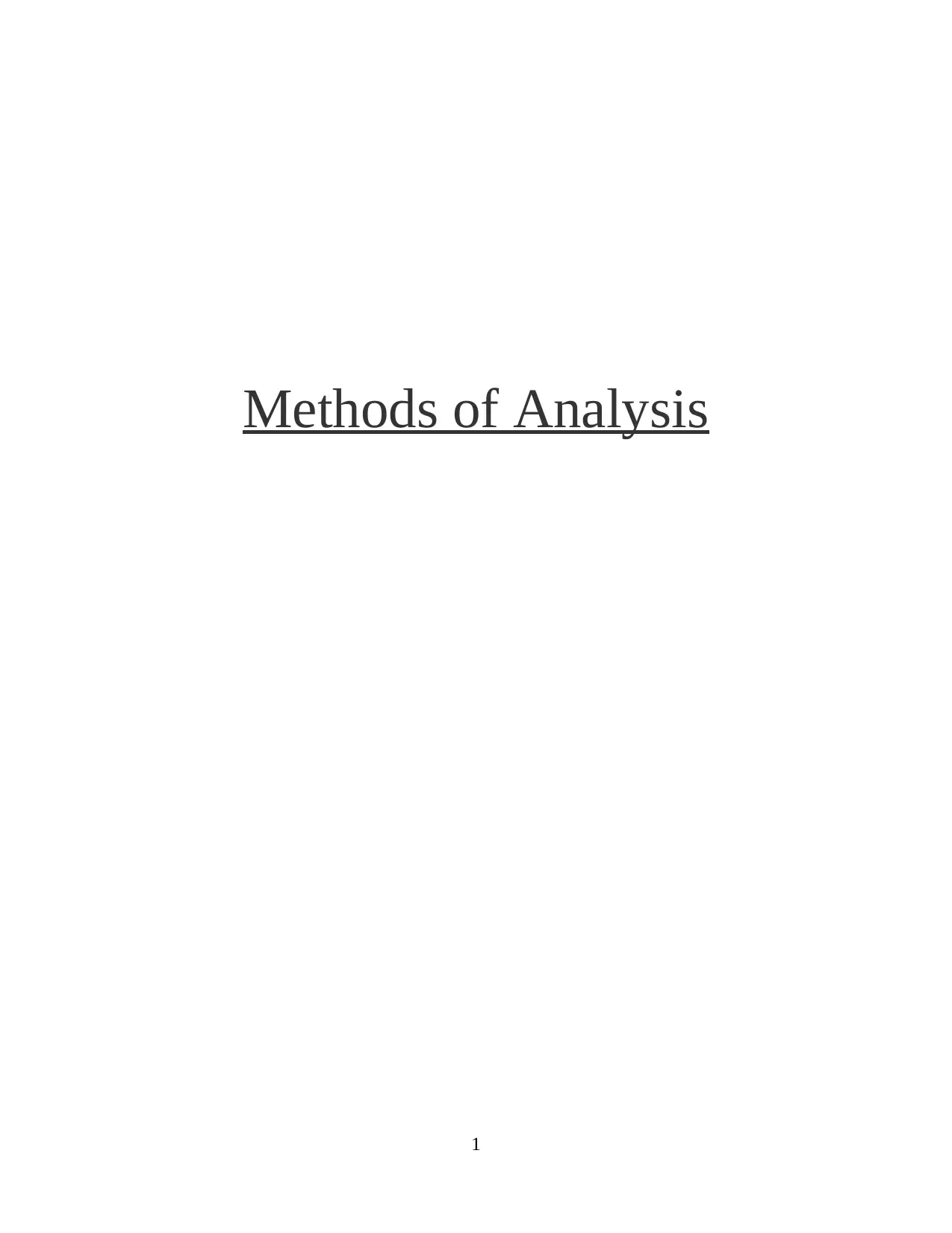
Methods of Analysis
1
1
Paraphrase This Document
Need a fresh take? Get an instant paraphrase of this document with our AI Paraphraser
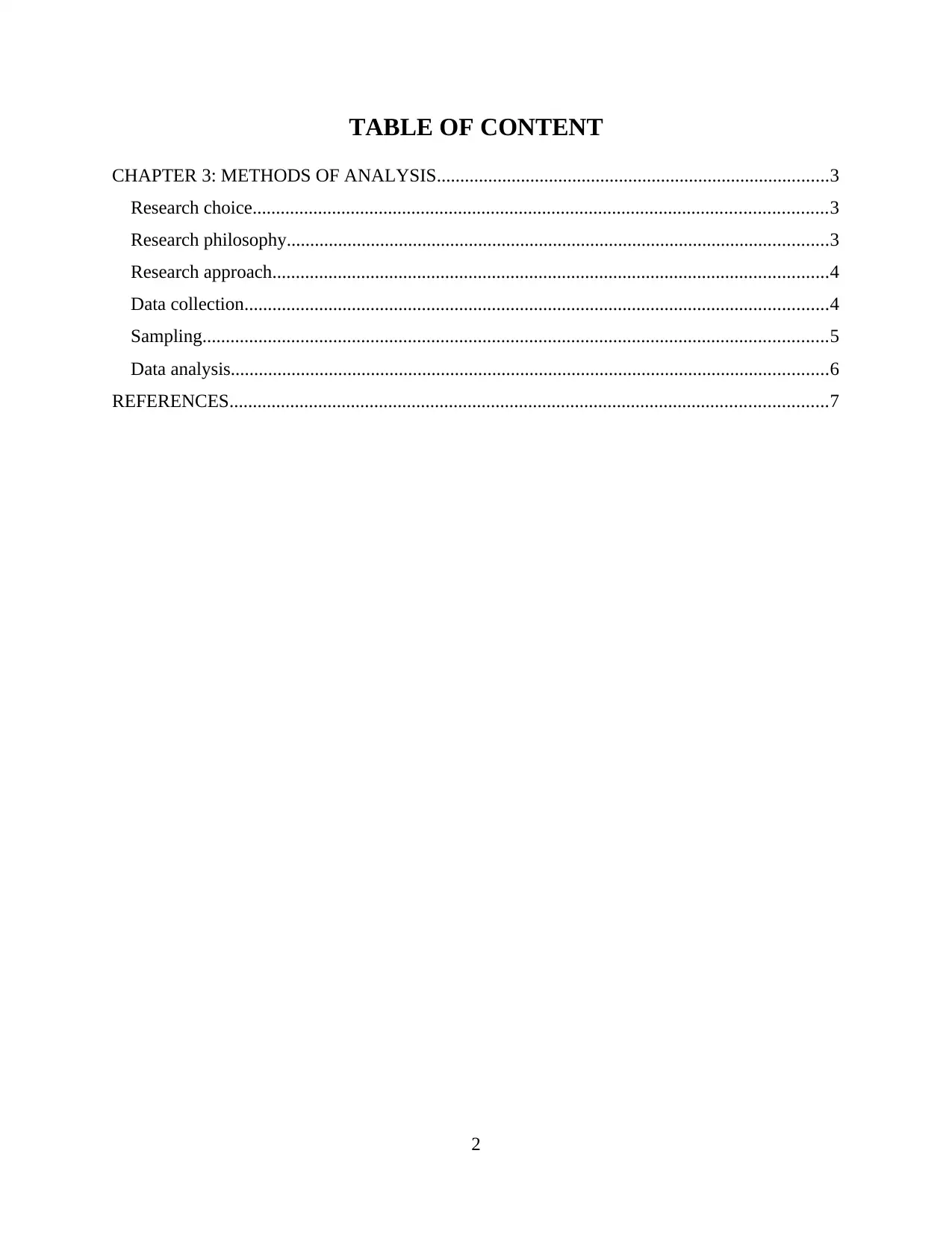
TABLE OF CONTENT
CHAPTER 3: METHODS OF ANALYSIS....................................................................................3
Research choice...........................................................................................................................3
Research philosophy....................................................................................................................3
Research approach.......................................................................................................................4
Data collection.............................................................................................................................4
Sampling......................................................................................................................................5
Data analysis................................................................................................................................6
REFERENCES................................................................................................................................7
2
CHAPTER 3: METHODS OF ANALYSIS....................................................................................3
Research choice...........................................................................................................................3
Research philosophy....................................................................................................................3
Research approach.......................................................................................................................4
Data collection.............................................................................................................................4
Sampling......................................................................................................................................5
Data analysis................................................................................................................................6
REFERENCES................................................................................................................................7
2
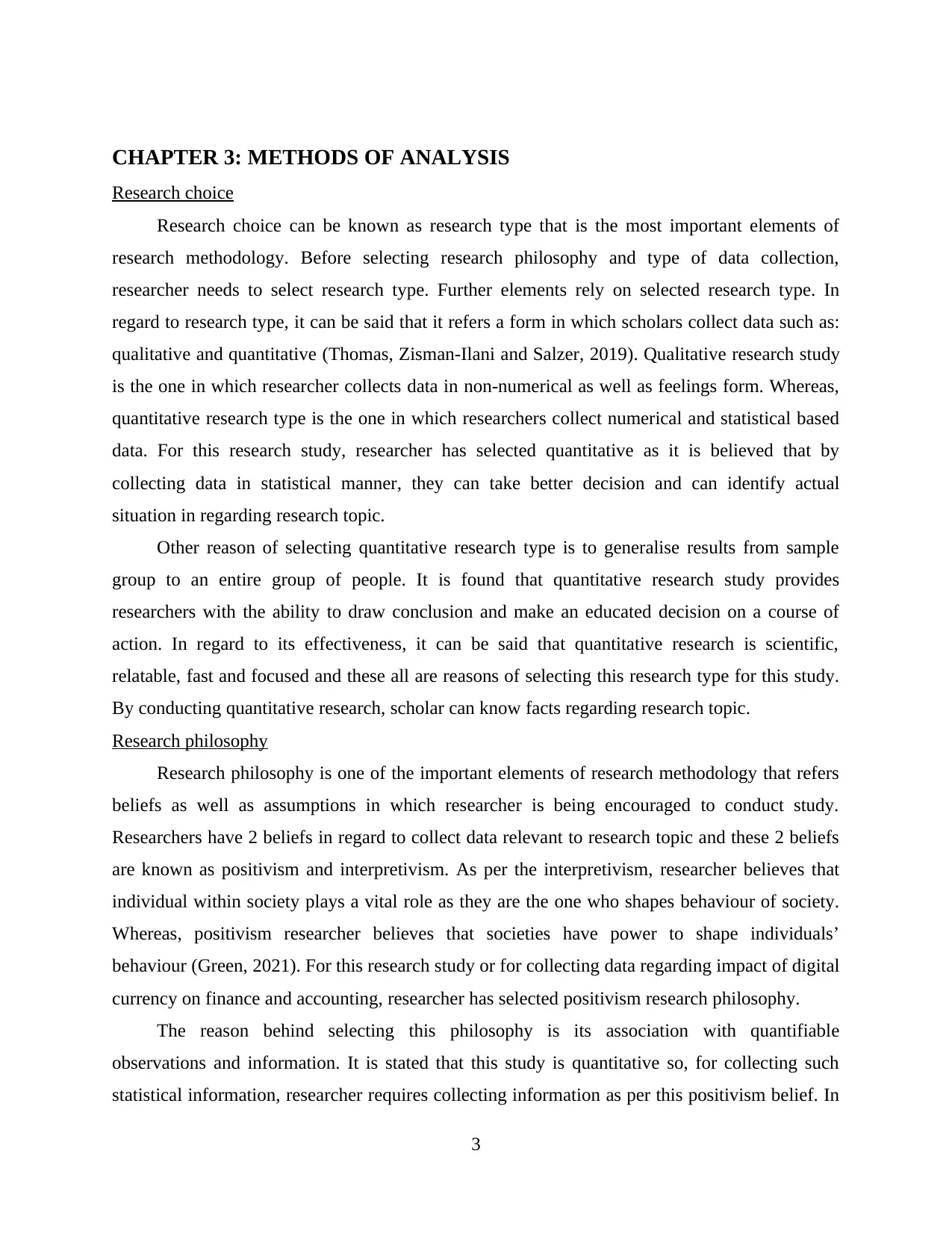
CHAPTER 3: METHODS OF ANALYSIS
Research choice
Research choice can be known as research type that is the most important elements of
research methodology. Before selecting research philosophy and type of data collection,
researcher needs to select research type. Further elements rely on selected research type. In
regard to research type, it can be said that it refers a form in which scholars collect data such as:
qualitative and quantitative (Thomas, Zisman-Ilani and Salzer, 2019). Qualitative research study
is the one in which researcher collects data in non-numerical as well as feelings form. Whereas,
quantitative research type is the one in which researchers collect numerical and statistical based
data. For this research study, researcher has selected quantitative as it is believed that by
collecting data in statistical manner, they can take better decision and can identify actual
situation in regarding research topic.
Other reason of selecting quantitative research type is to generalise results from sample
group to an entire group of people. It is found that quantitative research study provides
researchers with the ability to draw conclusion and make an educated decision on a course of
action. In regard to its effectiveness, it can be said that quantitative research is scientific,
relatable, fast and focused and these all are reasons of selecting this research type for this study.
By conducting quantitative research, scholar can know facts regarding research topic.
Research philosophy
Research philosophy is one of the important elements of research methodology that refers
beliefs as well as assumptions in which researcher is being encouraged to conduct study.
Researchers have 2 beliefs in regard to collect data relevant to research topic and these 2 beliefs
are known as positivism and interpretivism. As per the interpretivism, researcher believes that
individual within society plays a vital role as they are the one who shapes behaviour of society.
Whereas, positivism researcher believes that societies have power to shape individuals’
behaviour (Green, 2021). For this research study or for collecting data regarding impact of digital
currency on finance and accounting, researcher has selected positivism research philosophy.
The reason behind selecting this philosophy is its association with quantifiable
observations and information. It is stated that this study is quantitative so, for collecting such
statistical information, researcher requires collecting information as per this positivism belief. In
3
Research choice
Research choice can be known as research type that is the most important elements of
research methodology. Before selecting research philosophy and type of data collection,
researcher needs to select research type. Further elements rely on selected research type. In
regard to research type, it can be said that it refers a form in which scholars collect data such as:
qualitative and quantitative (Thomas, Zisman-Ilani and Salzer, 2019). Qualitative research study
is the one in which researcher collects data in non-numerical as well as feelings form. Whereas,
quantitative research type is the one in which researchers collect numerical and statistical based
data. For this research study, researcher has selected quantitative as it is believed that by
collecting data in statistical manner, they can take better decision and can identify actual
situation in regarding research topic.
Other reason of selecting quantitative research type is to generalise results from sample
group to an entire group of people. It is found that quantitative research study provides
researchers with the ability to draw conclusion and make an educated decision on a course of
action. In regard to its effectiveness, it can be said that quantitative research is scientific,
relatable, fast and focused and these all are reasons of selecting this research type for this study.
By conducting quantitative research, scholar can know facts regarding research topic.
Research philosophy
Research philosophy is one of the important elements of research methodology that refers
beliefs as well as assumptions in which researcher is being encouraged to conduct study.
Researchers have 2 beliefs in regard to collect data relevant to research topic and these 2 beliefs
are known as positivism and interpretivism. As per the interpretivism, researcher believes that
individual within society plays a vital role as they are the one who shapes behaviour of society.
Whereas, positivism researcher believes that societies have power to shape individuals’
behaviour (Green, 2021). For this research study or for collecting data regarding impact of digital
currency on finance and accounting, researcher has selected positivism research philosophy.
The reason behind selecting this philosophy is its association with quantifiable
observations and information. It is stated that this study is quantitative so, for collecting such
statistical information, researcher requires collecting information as per this positivism belief. In
3
⊘ This is a preview!⊘
Do you want full access?
Subscribe today to unlock all pages.

Trusted by 1+ million students worldwide
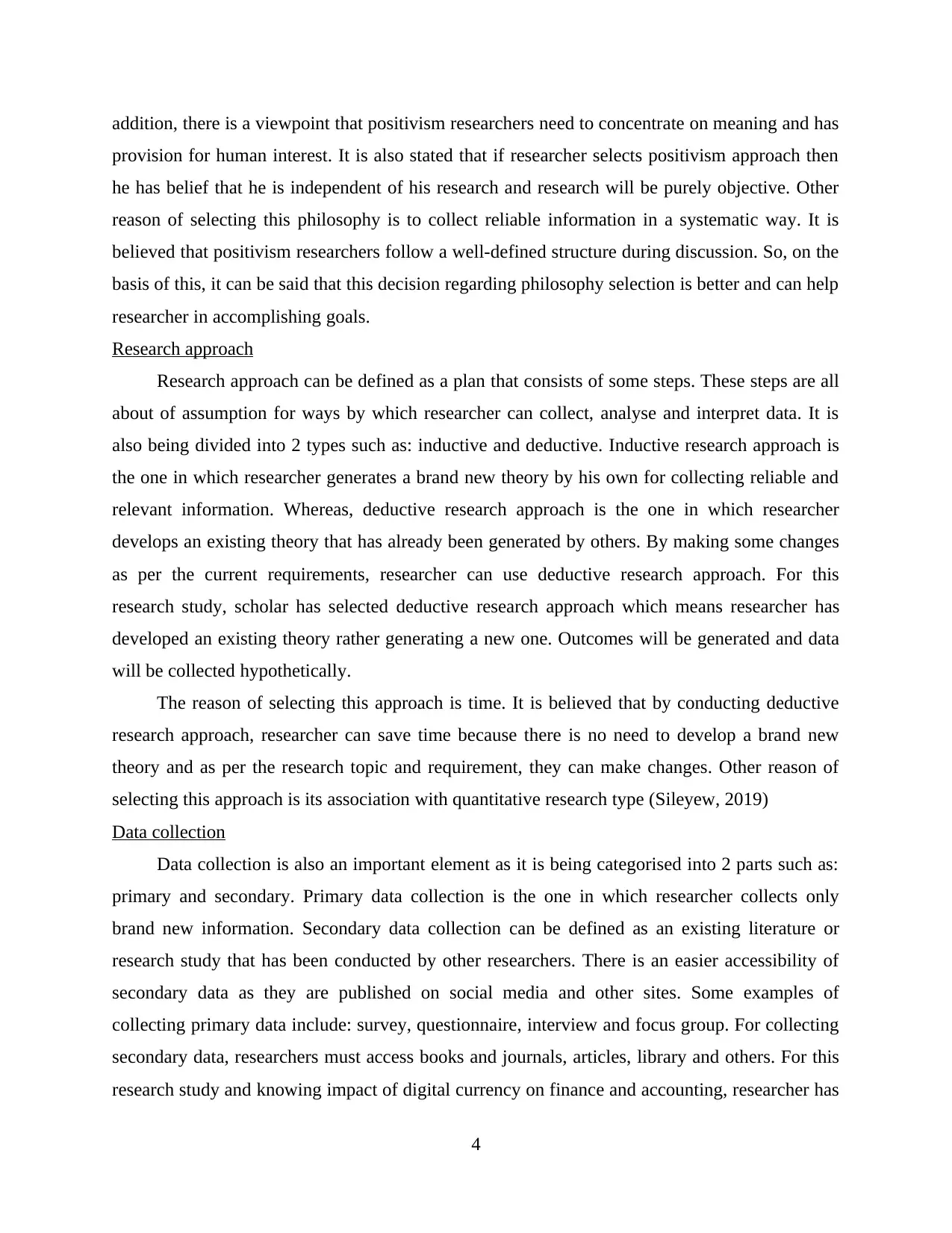
addition, there is a viewpoint that positivism researchers need to concentrate on meaning and has
provision for human interest. It is also stated that if researcher selects positivism approach then
he has belief that he is independent of his research and research will be purely objective. Other
reason of selecting this philosophy is to collect reliable information in a systematic way. It is
believed that positivism researchers follow a well-defined structure during discussion. So, on the
basis of this, it can be said that this decision regarding philosophy selection is better and can help
researcher in accomplishing goals.
Research approach
Research approach can be defined as a plan that consists of some steps. These steps are all
about of assumption for ways by which researcher can collect, analyse and interpret data. It is
also being divided into 2 types such as: inductive and deductive. Inductive research approach is
the one in which researcher generates a brand new theory by his own for collecting reliable and
relevant information. Whereas, deductive research approach is the one in which researcher
develops an existing theory that has already been generated by others. By making some changes
as per the current requirements, researcher can use deductive research approach. For this
research study, scholar has selected deductive research approach which means researcher has
developed an existing theory rather generating a new one. Outcomes will be generated and data
will be collected hypothetically.
The reason of selecting this approach is time. It is believed that by conducting deductive
research approach, researcher can save time because there is no need to develop a brand new
theory and as per the research topic and requirement, they can make changes. Other reason of
selecting this approach is its association with quantitative research type (Sileyew, 2019)
Data collection
Data collection is also an important element as it is being categorised into 2 parts such as:
primary and secondary. Primary data collection is the one in which researcher collects only
brand new information. Secondary data collection can be defined as an existing literature or
research study that has been conducted by other researchers. There is an easier accessibility of
secondary data as they are published on social media and other sites. Some examples of
collecting primary data include: survey, questionnaire, interview and focus group. For collecting
secondary data, researchers must access books and journals, articles, library and others. For this
research study and knowing impact of digital currency on finance and accounting, researcher has
4
provision for human interest. It is also stated that if researcher selects positivism approach then
he has belief that he is independent of his research and research will be purely objective. Other
reason of selecting this philosophy is to collect reliable information in a systematic way. It is
believed that positivism researchers follow a well-defined structure during discussion. So, on the
basis of this, it can be said that this decision regarding philosophy selection is better and can help
researcher in accomplishing goals.
Research approach
Research approach can be defined as a plan that consists of some steps. These steps are all
about of assumption for ways by which researcher can collect, analyse and interpret data. It is
also being divided into 2 types such as: inductive and deductive. Inductive research approach is
the one in which researcher generates a brand new theory by his own for collecting reliable and
relevant information. Whereas, deductive research approach is the one in which researcher
develops an existing theory that has already been generated by others. By making some changes
as per the current requirements, researcher can use deductive research approach. For this
research study, scholar has selected deductive research approach which means researcher has
developed an existing theory rather generating a new one. Outcomes will be generated and data
will be collected hypothetically.
The reason of selecting this approach is time. It is believed that by conducting deductive
research approach, researcher can save time because there is no need to develop a brand new
theory and as per the research topic and requirement, they can make changes. Other reason of
selecting this approach is its association with quantitative research type (Sileyew, 2019)
Data collection
Data collection is also an important element as it is being categorised into 2 parts such as:
primary and secondary. Primary data collection is the one in which researcher collects only
brand new information. Secondary data collection can be defined as an existing literature or
research study that has been conducted by other researchers. There is an easier accessibility of
secondary data as they are published on social media and other sites. Some examples of
collecting primary data include: survey, questionnaire, interview and focus group. For collecting
secondary data, researchers must access books and journals, articles, library and others. For this
research study and knowing impact of digital currency on finance and accounting, researcher has
4
Paraphrase This Document
Need a fresh take? Get an instant paraphrase of this document with our AI Paraphraser
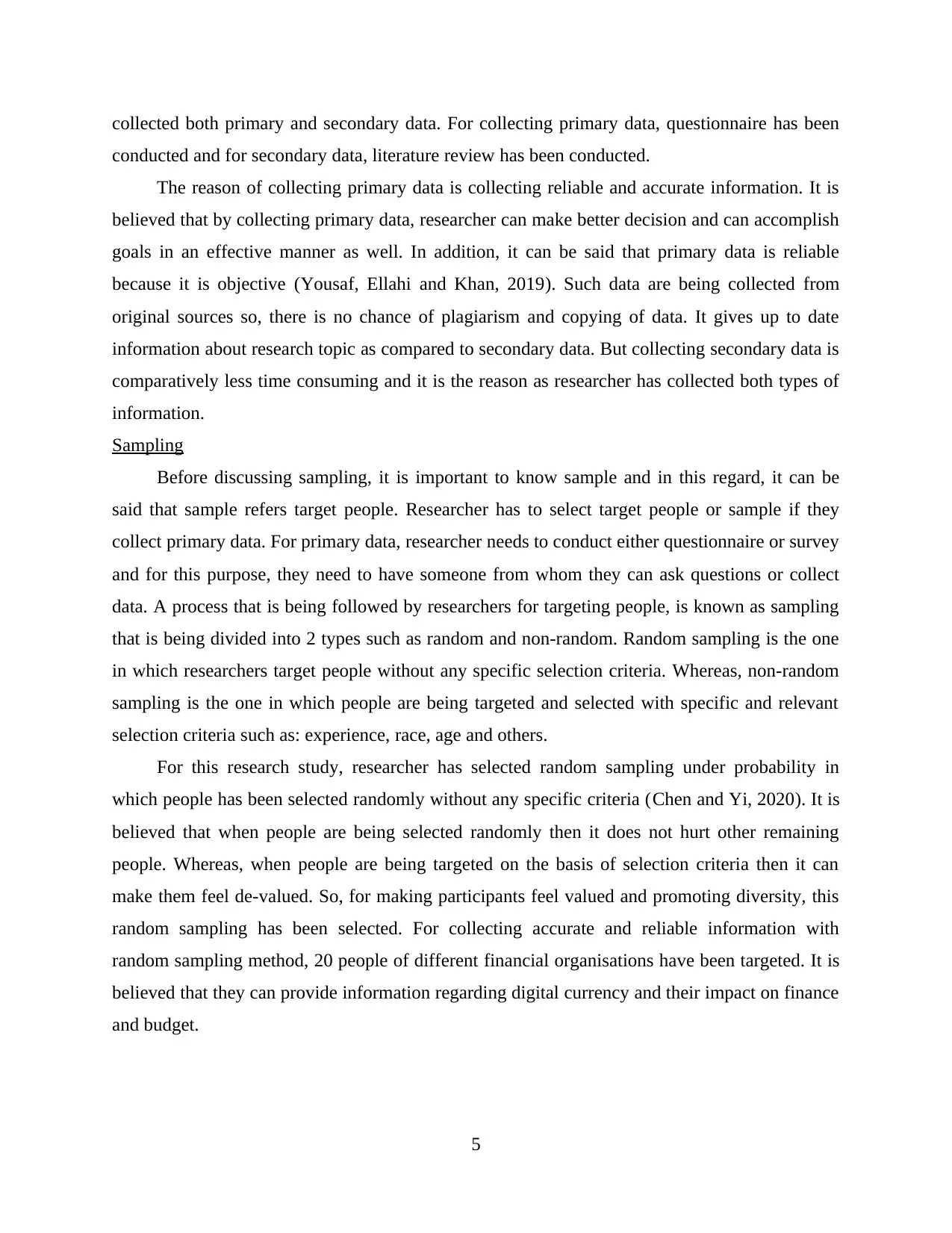
collected both primary and secondary data. For collecting primary data, questionnaire has been
conducted and for secondary data, literature review has been conducted.
The reason of collecting primary data is collecting reliable and accurate information. It is
believed that by collecting primary data, researcher can make better decision and can accomplish
goals in an effective manner as well. In addition, it can be said that primary data is reliable
because it is objective (Yousaf, Ellahi and Khan, 2019). Such data are being collected from
original sources so, there is no chance of plagiarism and copying of data. It gives up to date
information about research topic as compared to secondary data. But collecting secondary data is
comparatively less time consuming and it is the reason as researcher has collected both types of
information.
Sampling
Before discussing sampling, it is important to know sample and in this regard, it can be
said that sample refers target people. Researcher has to select target people or sample if they
collect primary data. For primary data, researcher needs to conduct either questionnaire or survey
and for this purpose, they need to have someone from whom they can ask questions or collect
data. A process that is being followed by researchers for targeting people, is known as sampling
that is being divided into 2 types such as random and non-random. Random sampling is the one
in which researchers target people without any specific selection criteria. Whereas, non-random
sampling is the one in which people are being targeted and selected with specific and relevant
selection criteria such as: experience, race, age and others.
For this research study, researcher has selected random sampling under probability in
which people has been selected randomly without any specific criteria (Chen and Yi, 2020). It is
believed that when people are being selected randomly then it does not hurt other remaining
people. Whereas, when people are being targeted on the basis of selection criteria then it can
make them feel de-valued. So, for making participants feel valued and promoting diversity, this
random sampling has been selected. For collecting accurate and reliable information with
random sampling method, 20 people of different financial organisations have been targeted. It is
believed that they can provide information regarding digital currency and their impact on finance
and budget.
5
conducted and for secondary data, literature review has been conducted.
The reason of collecting primary data is collecting reliable and accurate information. It is
believed that by collecting primary data, researcher can make better decision and can accomplish
goals in an effective manner as well. In addition, it can be said that primary data is reliable
because it is objective (Yousaf, Ellahi and Khan, 2019). Such data are being collected from
original sources so, there is no chance of plagiarism and copying of data. It gives up to date
information about research topic as compared to secondary data. But collecting secondary data is
comparatively less time consuming and it is the reason as researcher has collected both types of
information.
Sampling
Before discussing sampling, it is important to know sample and in this regard, it can be
said that sample refers target people. Researcher has to select target people or sample if they
collect primary data. For primary data, researcher needs to conduct either questionnaire or survey
and for this purpose, they need to have someone from whom they can ask questions or collect
data. A process that is being followed by researchers for targeting people, is known as sampling
that is being divided into 2 types such as random and non-random. Random sampling is the one
in which researchers target people without any specific selection criteria. Whereas, non-random
sampling is the one in which people are being targeted and selected with specific and relevant
selection criteria such as: experience, race, age and others.
For this research study, researcher has selected random sampling under probability in
which people has been selected randomly without any specific criteria (Chen and Yi, 2020). It is
believed that when people are being selected randomly then it does not hurt other remaining
people. Whereas, when people are being targeted on the basis of selection criteria then it can
make them feel de-valued. So, for making participants feel valued and promoting diversity, this
random sampling has been selected. For collecting accurate and reliable information with
random sampling method, 20 people of different financial organisations have been targeted. It is
believed that they can provide information regarding digital currency and their impact on finance
and budget.
5
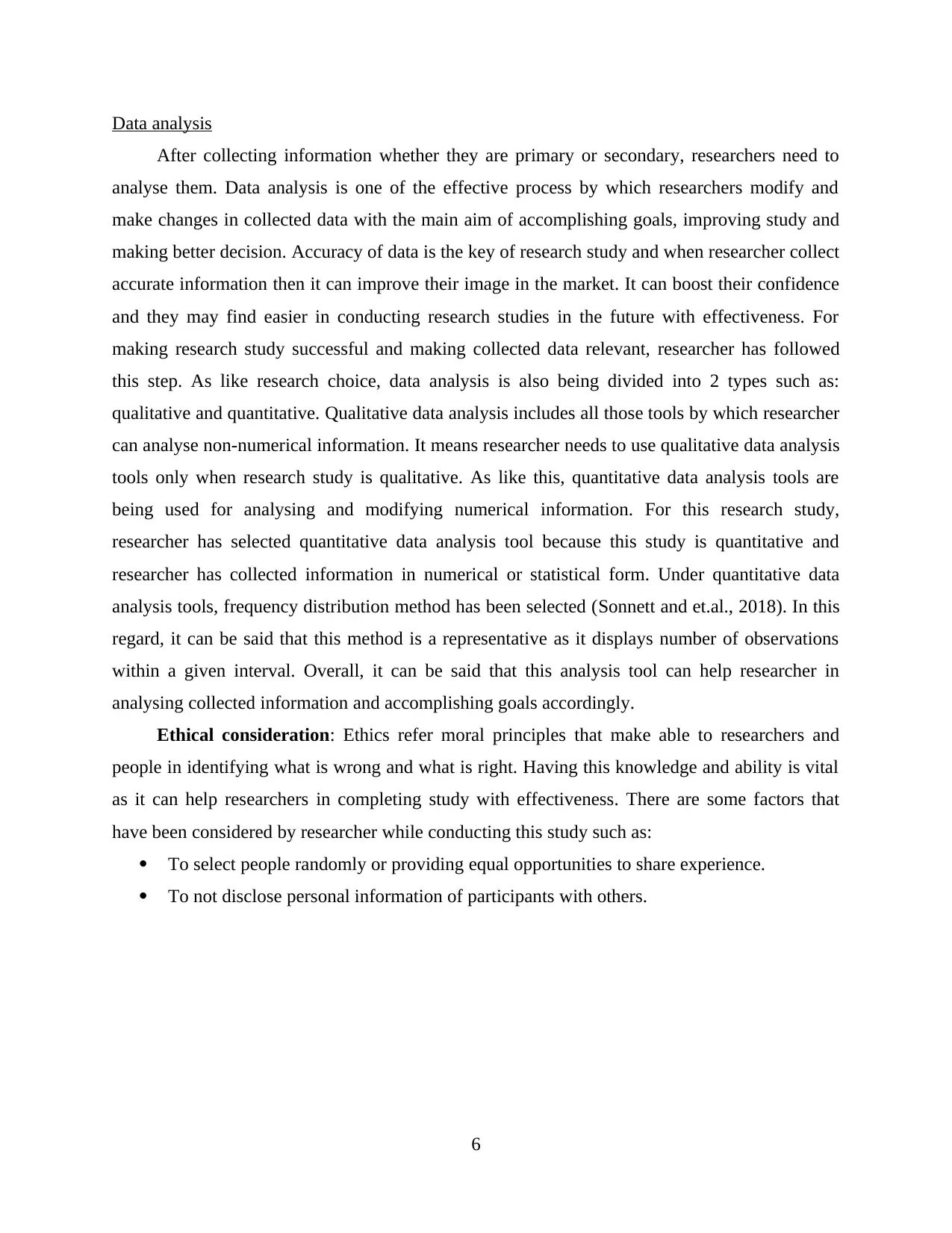
Data analysis
After collecting information whether they are primary or secondary, researchers need to
analyse them. Data analysis is one of the effective process by which researchers modify and
make changes in collected data with the main aim of accomplishing goals, improving study and
making better decision. Accuracy of data is the key of research study and when researcher collect
accurate information then it can improve their image in the market. It can boost their confidence
and they may find easier in conducting research studies in the future with effectiveness. For
making research study successful and making collected data relevant, researcher has followed
this step. As like research choice, data analysis is also being divided into 2 types such as:
qualitative and quantitative. Qualitative data analysis includes all those tools by which researcher
can analyse non-numerical information. It means researcher needs to use qualitative data analysis
tools only when research study is qualitative. As like this, quantitative data analysis tools are
being used for analysing and modifying numerical information. For this research study,
researcher has selected quantitative data analysis tool because this study is quantitative and
researcher has collected information in numerical or statistical form. Under quantitative data
analysis tools, frequency distribution method has been selected (Sonnett and et.al., 2018). In this
regard, it can be said that this method is a representative as it displays number of observations
within a given interval. Overall, it can be said that this analysis tool can help researcher in
analysing collected information and accomplishing goals accordingly.
Ethical consideration: Ethics refer moral principles that make able to researchers and
people in identifying what is wrong and what is right. Having this knowledge and ability is vital
as it can help researchers in completing study with effectiveness. There are some factors that
have been considered by researcher while conducting this study such as:
To select people randomly or providing equal opportunities to share experience.
To not disclose personal information of participants with others.
6
After collecting information whether they are primary or secondary, researchers need to
analyse them. Data analysis is one of the effective process by which researchers modify and
make changes in collected data with the main aim of accomplishing goals, improving study and
making better decision. Accuracy of data is the key of research study and when researcher collect
accurate information then it can improve their image in the market. It can boost their confidence
and they may find easier in conducting research studies in the future with effectiveness. For
making research study successful and making collected data relevant, researcher has followed
this step. As like research choice, data analysis is also being divided into 2 types such as:
qualitative and quantitative. Qualitative data analysis includes all those tools by which researcher
can analyse non-numerical information. It means researcher needs to use qualitative data analysis
tools only when research study is qualitative. As like this, quantitative data analysis tools are
being used for analysing and modifying numerical information. For this research study,
researcher has selected quantitative data analysis tool because this study is quantitative and
researcher has collected information in numerical or statistical form. Under quantitative data
analysis tools, frequency distribution method has been selected (Sonnett and et.al., 2018). In this
regard, it can be said that this method is a representative as it displays number of observations
within a given interval. Overall, it can be said that this analysis tool can help researcher in
analysing collected information and accomplishing goals accordingly.
Ethical consideration: Ethics refer moral principles that make able to researchers and
people in identifying what is wrong and what is right. Having this knowledge and ability is vital
as it can help researchers in completing study with effectiveness. There are some factors that
have been considered by researcher while conducting this study such as:
To select people randomly or providing equal opportunities to share experience.
To not disclose personal information of participants with others.
6
⊘ This is a preview!⊘
Do you want full access?
Subscribe today to unlock all pages.

Trusted by 1+ million students worldwide
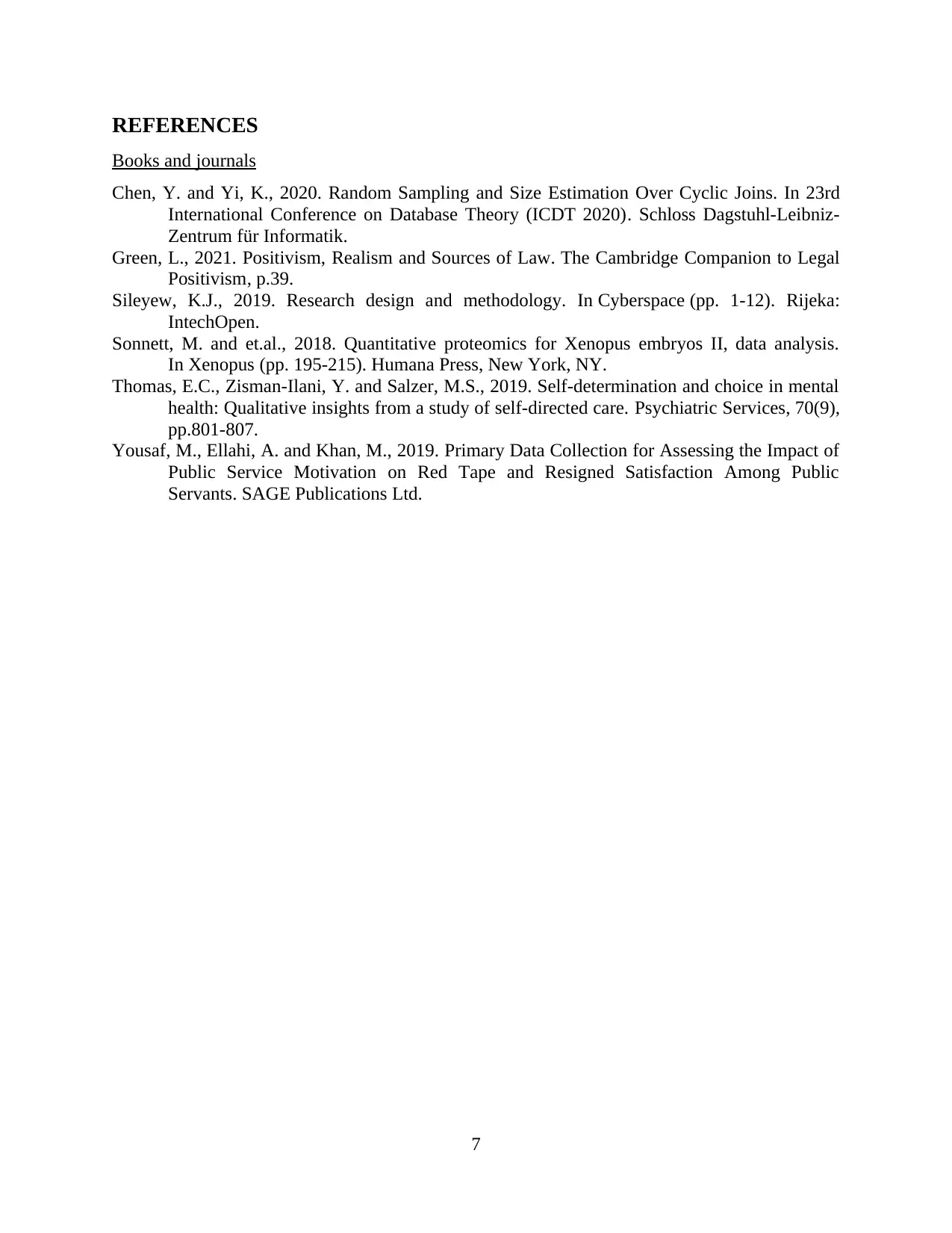
REFERENCES
Books and journals
Chen, Y. and Yi, K., 2020. Random Sampling and Size Estimation Over Cyclic Joins. In 23rd
International Conference on Database Theory (ICDT 2020). Schloss Dagstuhl-Leibniz-
Zentrum für Informatik.
Green, L., 2021. Positivism, Realism and Sources of Law. The Cambridge Companion to Legal
Positivism, p.39.
Sileyew, K.J., 2019. Research design and methodology. In Cyberspace (pp. 1-12). Rijeka:
IntechOpen.
Sonnett, M. and et.al., 2018. Quantitative proteomics for Xenopus embryos II, data analysis.
In Xenopus (pp. 195-215). Humana Press, New York, NY.
Thomas, E.C., Zisman-Ilani, Y. and Salzer, M.S., 2019. Self-determination and choice in mental
health: Qualitative insights from a study of self-directed care. Psychiatric Services, 70(9),
pp.801-807.
Yousaf, M., Ellahi, A. and Khan, M., 2019. Primary Data Collection for Assessing the Impact of
Public Service Motivation on Red Tape and Resigned Satisfaction Among Public
Servants. SAGE Publications Ltd.
7
Books and journals
Chen, Y. and Yi, K., 2020. Random Sampling and Size Estimation Over Cyclic Joins. In 23rd
International Conference on Database Theory (ICDT 2020). Schloss Dagstuhl-Leibniz-
Zentrum für Informatik.
Green, L., 2021. Positivism, Realism and Sources of Law. The Cambridge Companion to Legal
Positivism, p.39.
Sileyew, K.J., 2019. Research design and methodology. In Cyberspace (pp. 1-12). Rijeka:
IntechOpen.
Sonnett, M. and et.al., 2018. Quantitative proteomics for Xenopus embryos II, data analysis.
In Xenopus (pp. 195-215). Humana Press, New York, NY.
Thomas, E.C., Zisman-Ilani, Y. and Salzer, M.S., 2019. Self-determination and choice in mental
health: Qualitative insights from a study of self-directed care. Psychiatric Services, 70(9),
pp.801-807.
Yousaf, M., Ellahi, A. and Khan, M., 2019. Primary Data Collection for Assessing the Impact of
Public Service Motivation on Red Tape and Resigned Satisfaction Among Public
Servants. SAGE Publications Ltd.
7
1 out of 7
Related Documents
Your All-in-One AI-Powered Toolkit for Academic Success.
+13062052269
info@desklib.com
Available 24*7 on WhatsApp / Email
![[object Object]](/_next/static/media/star-bottom.7253800d.svg)
Unlock your academic potential
Copyright © 2020–2025 A2Z Services. All Rights Reserved. Developed and managed by ZUCOL.





